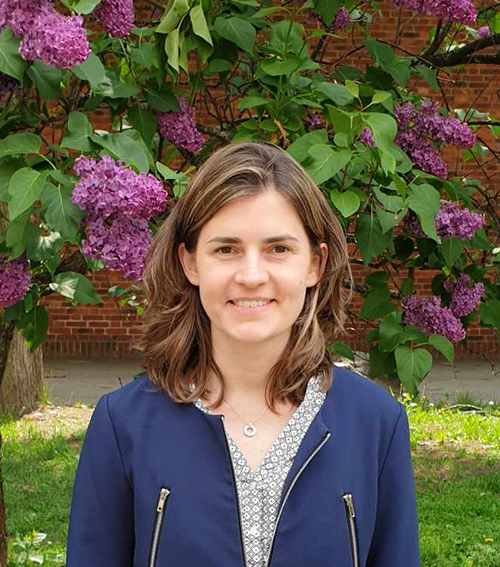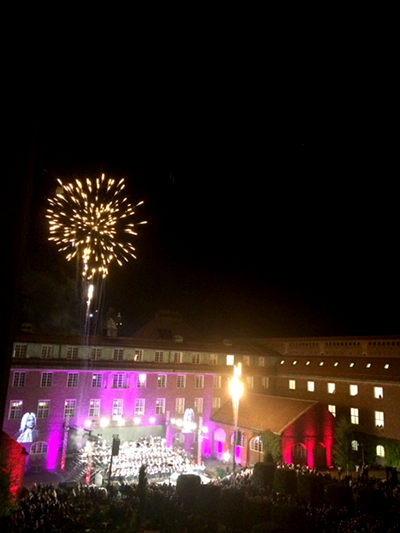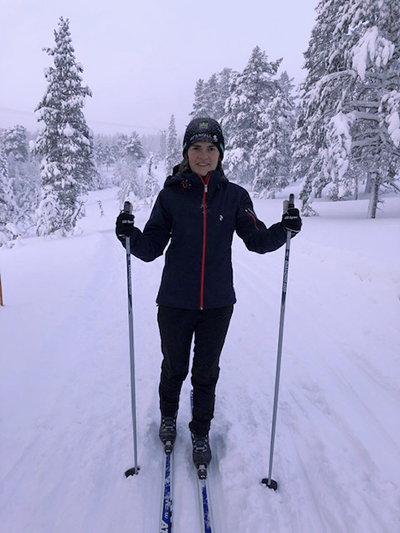Charlotta continues her career in academia and is now doing research into hydropower
Charlotta Ahlfors graduated from the master’s programme in Electric Power Engineering in 2017. She is currently doing a PhD at KTH.

Hi Charlotta, what are you doing at the moment?
I am working as a PhD student at the Department of Electric Power and Energy Systems at KTH. My research project is about weekly planning of hydropower in systems with large volumes and varying power generation. The aim of the project is to find planning models for several hydropower plants located in one river. I am studying earlier research and developing planning techniques based on these studies. Therefore, I am considering how to formulate the problem mathematically and code it to make simulations and test the model. Moreover, as a PhD student I also study courses at a research level (and sometimes master’s level) that are related to my research. For example, I have studied courses in optimization theory and regression analysis. Another part of the job as a PhD student is to go to conferences and present your current research. For example, I went to a conference on hydropower scheduling in competitive electricity markets in Norway last year (2018).
What can a regular day look like?
During a typical workday I work in front of my computer, read printed papers and go to one or several meetings with my PhD supervisor, students that I am supervising or colleagues. Usually the workday is during office hours. But sometimes I use a couple of hours in the evening or during the weekends as well, for example when I am studying for an exam.

Have you worked with anything else since you graduated?
I started as a PhD student directly after I graduated from KTH. I am glad that I could start directly after my studies since I applied to the position before I started my master’s project.
Why did you choose this programme at KTH?
I studied the Civil Engineering Programme in Energy and Environment at KTH. During my first two years, I enjoyed courses in Mathematics. I learned many new things in these courses that felt valuable for the future. The typical programme courses in energy and environment were also interesting, but I didn’t learn a lot of new stuff as I had taken similar courses in high school. However, I did learn a lot related to energy and the environment during my second year in a course called Electric circuit analysis. A technical perspective of energy and environmental questions was presented, in terms of basics on electrical components and their applications, which I found very interesting. For me, knowledge on power systems is a very interesting aspect of energy and the environment and sustainable development, and something that I wanted to learn more about. Therefore, I chose the Master’s programme in Electric Power Engineering.
Are there any insights or knowledge you acquired during your studies that have been particularly useful for you in your career?
Most of the time the studies are fun and challenging in a positive way, but sometimes it can feel a bit daunting studying complex subjects. I learned strategies to do a little bit more and a little bit more, instead of giving up. It is an incredibly important insight that I take with me through life. There is wisdom from a story that says, "listen with a deaf ear when you hear negative comments around you such as; this is difficult, this is not going to happen, etc.” I have practiced and found strategies to think positively and take me through difficult times.

What were the best aspects of your studies at KTH?
The best aspects of my studies at KTH are both knowledge based and social aspects. When I started at KTH, I could use knowledge that I already had and develop it a lot further through the different courses. There are many interesting courses at KTH and many good teachers who are deeply engaged in their topic and good at teaching. Furthermore, the studies connect you to your future career, either within academia or in industrial companies.
What is your best memory from your time at the university?
Of course, some very good memories are the people who I have met during my studies. But I also think that growing as a person from things that you learn and experience, is a very good memory.
What are your plans for the future?
My plans for the nearest future are to finalize my PhD project and get my doctorate. After that I would like to continue to work with electric power systems. Of course, it would be interesting to work with hydropower plants, but I can also think of other interesting topics related to power systems, for example other renewable power sources and energy storage. I am interested in jobs both in academia and in industrial companies.
What would you say to a student thinking of applying for this programme?
The Master’s programme in Electric Power Engineering is a very good education within engineering. It is suitable for students with backgrounds in Electric Engineering or Energy and the Environment. There are many different courses to choose from, and you can specialize in electric power systems and markets, power system operation control and automation, power electronics and drives and modelling of electro technical equipment. You will study courses that teach the basics within the different areas of electrical power engineering giving you an opportunity to find the area that you find most interesting. However, my recommendation is that you try to figure out which area you are most interested in as early as possible since this will make it easier to choose courses that are suitable for your specialization.
Moreover, you will choose some freely elective courses and I think that courses in mathematics (such as for example optimization theory and probability theory) and courses in programming are good complements to all of the courses in electric power engineering.
Finally, I would like to say something about my experience of the workload and difficulty level in the programme. My experience is that the courses may seem a bit challenging in the beginning, but as soon as you learn more it becomes easier to understand the topic. The courses require that you are willing to understand and put effort into assignments, and if you do that you will learn a lot and have a lot of fun while you are studying.
